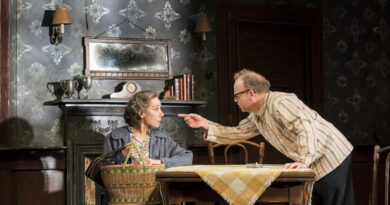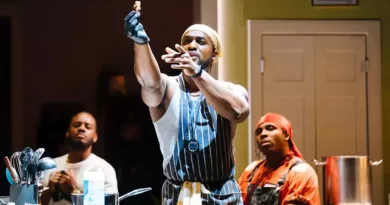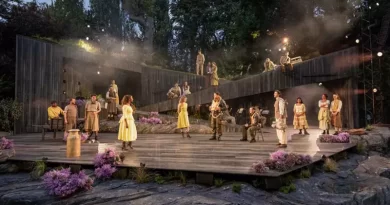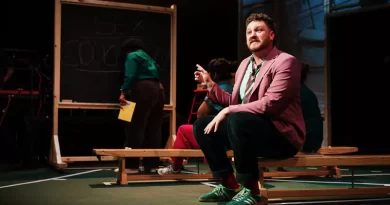“The Importance of Being Oscar” at Jermyn Street Theatre
Neil Dowden in the West End
3 April 2025
The great Irish stage actor Micheál Mac Liammóir co-founded the Gate Theatre in Dublin in 1928, where he played many of the big classical roles (as well as Iago in Orson Welles’s film of Othello). But he had his biggest success with his 1960 one-man play about Oscar Wilde The Importance of Being Oscar which he continued to perform internationally for 15 years. Now, Original Theatre and Reading Rep have revived their production from last year where it was staged not far from the defunct Reading Gaol in which Wilde was imprisoned for two years. Sensitively directed by Michael Fentiman, Alastair Whatley deftly conveys both the writer’s witty iconoclasm and his tragic fall from grace.

Photo credit: Marc Brenner.
The show begins with a short recording of Mac Liammóir’s voice speaking the part as Whatley puts the play in context – also pointing out that the area of London in which Jermyn Street is located, Piccadilly, is one closely associated with Wilde’s life. This may seem to cut across the subjective perspective of the bio-drama, but in fact this is not a piece where an actor just embodies Wilde. Whatley skilfully negotiates the play’s different layers, acting as narrator, Wilde speaking in his own words, and multiple people and characters in his life and writings.
Whatley adopts an upper-middle-class English accent for the Dublin-born Wilde who it seems consciously shed his Irish brogue when a student at Oxford University. (Strangely, the similarly performative Mac Liammóir did the exact opposite – after his death it emerged that he had completely fabricated his accent, name, and Irish roots, as he was from London not Cork as he claimed!) Already a celebrity at Oxford, the flamboyantly dressed and mannered Wilde becomes a darling of upper-crust London society as he entertainingly challenges the conventions of Victorian culture with his bon mots on aestheticism – “art for art’s sake”.
Whatley reads a little of Wilde’s early surprisingly romantic poetry and we hear of his infatuation with the socialite actress Lillie Langtry. There is also a comic account of his art lecture tour of the US where he told customs officials “I have nothing to declare except my genius” and drank bemused Colorado silver miners under the table. But there is just a brief mention of his marrying Constance (with whom he later had two sons).
Starting with Lady Windermere’s Fan, his playwriting career took off, while his notorious novel The Picture of Dorian Gray caused a sensation in the decadent 1890s. He reached his zenith with the rapturous reception of The Importance of Being Earnest. (Whatley gives an amusing performance of Lady Bracknell’s “handbag” scene). But weeks later after suing the Marquess of Queensberry, father of his lover Lord Alfred Douglas (“Bosie”), he was convicted of “gross indecency” (there is a poignant excerpt from the trial in which Wilde explains “the love that dare not speak its name”). Wilde’s downfall is eloquently symbolized by Whatley dropping a green carnation buttonhole to the ground.
The show is very much a play of two halves as it becomes much darker – literally and emotionally – after the interval. Whatley movingly reads an extended extract from De Produndis, Wilde’s long impassioned letter written to Bosie while in prison. We also hear some of The Ballad of Reading Gaol (with its resonant line “Yet each man kills the thing he loves”) penned shortly after his release. The sad last few years lead to his death in a dingy hotel in Paris in 1900, aged only 46. But his reputed last words still raise a laugh: “This wallpaper is killing me. One of us has to go.”
Whatley (who is artistic director of Original Theatre and first performed this play 15 years ago) gives a beautifully modulated performance, subtly capturing Wilde’s mixture of sophisticated wit, attention-seeking eccentricity, and self-destructive behaviour, as well his essential seriousness as an artist. Dressed in a reddish-brown, three-piece velvet suit and a cravat, he cuts an elegant, dandyish figure without overdoing the extravagance.
The nuanced staging by Fentiman (who directed a revisionist, openly gay production of The Importance of Being Earnest at the Vaudeville Theatre, as well as Joe Orton’s subversive camp comedy Loot at Park Theatre) makes the most of the intimacy of Jermyn Street Theatre. The simple set of Madeleine Girling (who is also costume designer) features a circular dais with an illuminated border, mirrored by another one which is used to good effect to suggest a proscenium arch or Dorian Gray’s imagined portrait, while an ornate lamp in the first half is replaced later by a stool to signal Wilde’s change in status. Chris Davey’s dextrous lighting effects and Barnaby Race’s understated music also contribute to shifts in mood, in the portrayal of a life full of extraordinary ups and downs.









